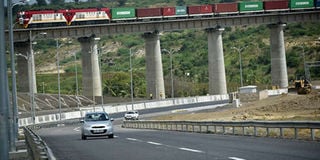Kenya, not China, should benefit from our infrastructure projects

A standard gauge railway cargo train leaves Miritini, in Mombasa, on December 5, 2018. China's favourite projects in Africa have been road, rail and seaport infrastructure to enhance transportation. PHOTO | FILE | NATION MEDIA GROUP
What you need to know:
- By opening up our road, rail and port networks to China, we are actually helping the foreign country to increase its volume of exports to Kenya.
- Kenya stands a better chance in first exploiting its comparative advantage in agriculture at a time when there have been increases in global food prices.
The threat to Kenya’s sovereignty should it default on repaying its standard gauge railway loans to China should not be a surprise.
Last year, several African heads of state signed a deal with Chinese President Xi Jinping and were promised $90 billion (Ksh9.1 trillion) “unconditional” loans.
Whenever goods are advertised as “free”, one should try to see the catch. There is no ‘free lunch’; everything has a price.
In fact, when a deal is too good to be true, think twice. Therefore, although $90 billion is pocket change for the Chinese reserve bank, it would be naive to believe that a loan has no strings attached.
China has maintained a communist regime that has silently, but strategically, developed its economic power to surpass other global giants just over the past 40 years due to its shrewd economic management. It is now a power to be reckoned with.
MINERALS
In the past 20 years, the Asian country has made inroads into Africa by dangling the loans and infrastructure development carrot that gullible Africans have grabbed.
Its favourite projects have been road, rail and seaport infrastructure to enhance transportation.
However, most of these projects are in strategic areas with unexploited mineral deposits such as copper, iron ore, coal and gold.
Kenya’s SGR line was strategically built along a belt that is rich in iron ore, coal, titanium and fluorspar.
In fact, China will also target exploiting the minerals in the past of these networks in their raw form and then sell them back to Africa as value-added products.
TRADE
Isn’t this path similar to how our former colonialists organised their commercial interests in Africa?
While it is true that these infrastructure projects have been useful to Kenyans, in the long run, who will be the greatest beneficiary?
I have reasons to believe it will be China due to its sheer volume of exports to Kenya, estimated at over $300 billion as compared to Kenya’s less than $9 billion.
By opening up our road, rail and port networks to China, we are actually helping the foreign country to increase its volume of exports to Kenya.
Those who defend China’s infrastructure projects in Africa believe they are in the continent’s best interests.
And yet evidence from past industrialised nations shows that road infrastructure was only built once countries had a significant industrial capacity and enough products to export.
AGRICULTURE
Using proceeds from the exports — foreign exchange — they could quickly pay off their infrastructure creditors without hurting the economy.
If we are really going to benefit in infrastructure projects, we should capitalise on projects such as building dams and irrigation schemes because sustainable supply of water would be a game changer for agriculture and industry.
Few countries have ever industrialised without a sound agricultural base.
Agriculture brings about industrial revolution as it has a multiplier effect while giving citizens food security.
This is what China did in the 1950s and ’60s and is now able to feed its over one billion citizens. It is highly unlikely that China would have industrialised without a sustainable agricultural base.
HEALTH
Kenya stands a better chance in first exploiting its comparative advantage in agriculture at a time when there have been increases in global food prices and a demand in organically grown foods.
In addition, Africa has unique medicinal plants, which can be an opportunity to develop a strong pharmaceutical industry.
It is unfortunate that we are selling our patent rights to Chinese manufacturers during science competitions for technical colleges.
This is, certainly, a big loss of the individuals’ intellectual property and the country’s manufacturing capability.
For Kenya to benefit from its dalliance with the Oriental ‘Dragon’, it ought to craft a better strategy.
More infrastructure amid limited exports will not be beneficial to Kenya but to those who export to us the most goods: The People’s Republic of China.
Ms Gachire is a lecturer at the Kenya School of Government. [email protected]




